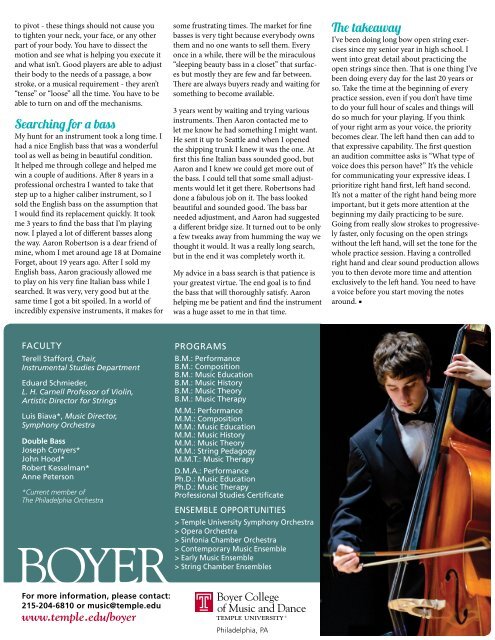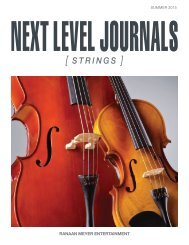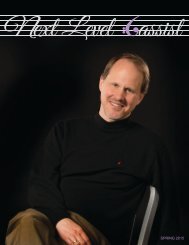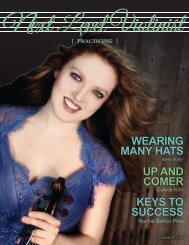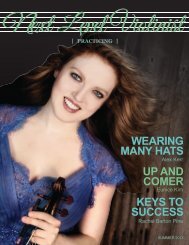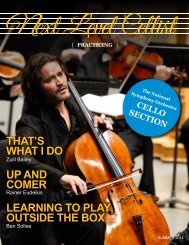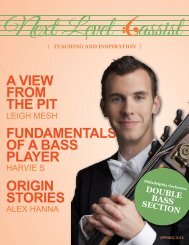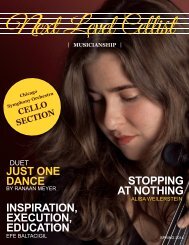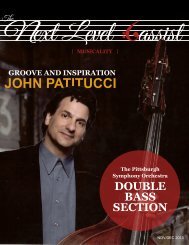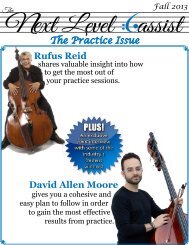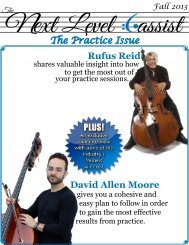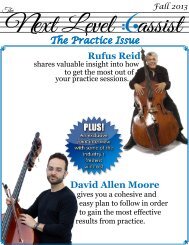Next Level Bassist Left Hand
Summer 2014 edition of Next Level Bassist. Left hand techniques and exercises by Nicholas Walker, Jordan Anderson, Paul Kowert. Section Spotlight on Cleveland Orchestra. Up and Comers Tim Dilenschneider and Jordan Morton
Summer 2014 edition of Next Level Bassist. Left hand techniques and exercises by Nicholas Walker, Jordan Anderson, Paul Kowert. Section Spotlight on Cleveland Orchestra. Up and Comers Tim Dilenschneider and Jordan Morton
You also want an ePaper? Increase the reach of your titles
YUMPU automatically turns print PDFs into web optimized ePapers that Google loves.
to pivot - these things should not cause you<br />
to tighten your neck, your face, or any other<br />
part of your body. You have to dissect the<br />
motion and see what is helping you execute it<br />
and what isn’t. Good players are able to adjust<br />
their body to the needs of a passage, a bow<br />
stroke, or a musical requirement - they aren’t<br />
“tense” or “loose” all the time. You have to be<br />
able to turn on and off the mechanisms.<br />
Searching for a bass<br />
My hunt for an instrument took a long time. I<br />
had a nice English bass that was a wonderful<br />
tool as well as being in beautiful condition.<br />
It helped me through college and helped me<br />
win a couple of auditions. After 8 years in a<br />
professional orchestra I wanted to take that<br />
step up to a higher caliber instrument, so I<br />
sold the English bass on the assumption that<br />
I would find its replacement quickly. It took<br />
me 3 years to find the bass that I’m playing<br />
now. I played a lot of different basses along<br />
the way. Aaron Robertson is a dear friend of<br />
mine, whom I met around age 18 at Domaine<br />
Forget, about 19 years ago. After I sold my<br />
English bass, Aaron graciously allowed me<br />
to play on his very fine Italian bass while I<br />
searched. It was very, very good but at the<br />
same time I got a bit spoiled. In a world of<br />
incredibly expensive instruments, it makes for<br />
some frustrating times. The market for fine<br />
basses is very tight because everybody owns<br />
them and no one wants to sell them. Every<br />
once in a while, there will be the miraculous<br />
“sleeping beauty bass in a closet” that surfaces<br />
but mostly they are few and far between.<br />
There are always buyers ready and waiting for<br />
something to become available.<br />
3 years went by waiting and trying various<br />
instruments. Then Aaron contacted me to<br />
let me know he had something I might want.<br />
He sent it up to Seattle and when I opened<br />
the shipping trunk I knew it was the one. At<br />
first this fine Italian bass sounded good, but<br />
Aaron and I knew we could get more out of<br />
the bass. I could tell that some small adjustments<br />
would let it get there. Robertsons had<br />
done a fabulous job on it. The bass looked<br />
beautiful and sounded good. The bass bar<br />
needed adjustment, and Aaron had suggested<br />
a different bridge size. It turned out to be only<br />
a few tweaks away from humming the way we<br />
thought it would. It was a really long search,<br />
but in the end it was completely worth it.<br />
My advice in a bass search is that patience is<br />
your greatest virtue. The end goal is to find<br />
the bass that will thoroughly satisfy. Aaron<br />
helping me be patient and find the instrument<br />
was a huge asset to me in that time.<br />
The takeaway<br />
I’ve been doing long bow open string exercises<br />
since my senior year in high school. I<br />
went into great detail about practicing the<br />
open strings since then. That is one thing I’ve<br />
been doing every day for the last 20 years or<br />
so. Take the time at the beginning of every<br />
practice session, even if you don’t have time<br />
to do your full hour of scales and things will<br />
do so much for your playing. If you think<br />
of your right arm as your voice, the priority<br />
becomes clear. The left hand then can add to<br />
that expressive capability. The first question<br />
an audition committee asks is “What type of<br />
voice does this person have?” It’s the vehicle<br />
for communicating your expressive ideas. I<br />
prioritize right hand first, left hand second.<br />
It’s not a matter of the right hand being more<br />
important, but it gets more attention at the<br />
beginning my daily practicing to be sure.<br />
Going from really slow strokes to progressively<br />
faster, only focusing on the open strings<br />
without the left hand, will set the tone for the<br />
whole practice session. Having a controlled<br />
right hand and clear sound production allows<br />
you to then devote more time and attention<br />
exclusively to the left hand. You need to have<br />
a voice before you start moving the notes<br />
around. ■<br />
Faculty<br />
terell Stafford, Chair,<br />
Instrumental Studies Department<br />
Eduard Schmieder,<br />
L. H. Carnell Professor of Violin,<br />
Artistic Director for Strings<br />
luis Biava*, Music Director,<br />
Symphony Orchestra<br />
Double Bass<br />
Joseph conyers*<br />
John Hood*<br />
Robert Kesselman*<br />
anne Peterson<br />
*Current member of<br />
The Philadelphia Orchestra<br />
PRogRamS<br />
B.m.: Performance<br />
B.m.: composition<br />
B.m.: music Education<br />
B.m.: music History<br />
B.m.: music theory<br />
B.m.: music therapy<br />
m.m.: Performance<br />
m.m.: composition<br />
m.m.: music Education<br />
m.m.: music History<br />
m.m.: music theory<br />
m.m.: String Pedagogy<br />
m.m.t.: music therapy<br />
D.m.a.: Performance<br />
Ph.D.: music Education<br />
Ph.D.: music therapy<br />
Professional Studies certificate<br />
EnSEmBlE oPPoRtunitiES<br />
> temple university Symphony orchestra<br />
> opera orchestra<br />
> Sinfonia chamber orchestra<br />
> contemporary music Ensemble<br />
> Early music Ensemble<br />
> String chamber Ensembles<br />
For more information, please contact:<br />
215-204-6810 or music@temple.edu<br />
www.temple.edu/boyer<br />
8 SUMMER 2014 NEXT LEVEL BASSIST<br />
Philadelphia, PA


